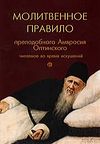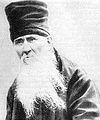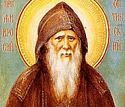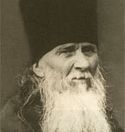 Holy Apostle Philip of the Seventy, one of the seven deacons (1st c.).
Holy Apostle Philip of the Seventy, one of the seven deacons (1st c.).  St. Theophanes Graptus (“the Branded”), confessor and hymnographer, bishop of Nicaea (850). Synaxis of the Elders of Optina: Sts. Leonid (repose) (1841), Macarius (1860), Moses (1862), Anthony (1865), Hilarion (1873), Ambrose (1891), Anatole I (1894), Isaac I (1894), Joseph (1911), Barsanuphius (1913), Anatole II (1922), Nektary (1928), New Hiero-confessor Nikon (1931), and New Hieromartyr Archimandrite Isaac II (1937).
St. Theophanes Graptus (“the Branded”), confessor and hymnographer, bishop of Nicaea (850). Synaxis of the Elders of Optina: Sts. Leonid (repose) (1841), Macarius (1860), Moses (1862), Anthony (1865), Hilarion (1873), Ambrose (1891), Anatole I (1894), Isaac I (1894), Joseph (1911), Barsanuphius (1913), Anatole II (1922), Nektary (1928), New Hiero-confessor Nikon (1931), and New Hieromartyr Archimandrite Isaac II (1937).
Martyrs Zenaida (Zenais) and Philonilla, of Tarsus in Cilicia (1st c.). St. Theophanes, faster, of the Kiev Caves (12th c.).
New Hieromartyr Juvenal (Maslovsky), archbishop of Ryazan and Shatzk (1937).
Sts. Nectarius (397), Arsacius (405), and Sinisius (427), archbishops of Constantinople. St. Cainnech (Kenneth), abbot, of Aghaboe (Ireland), and missionary in Scotland (600). St. Ethelburga, foundress of the monastery of Barking (England) (ca. 676). St. Gommar, patron of Lier (Neth.) (775). Commemoration of the Miracle from the Icon of Our Lord Jesus Christ in Beirut of Phoenicia (7th c.). St. Sabbas, fool-for- Christ, of Vatopedi, Mt. Athos (1349). St. Philotheus (Kokkinos) of Mt. Athos, patriarch of Constantinople (1379).
Monday. [Phil. 4:10-23; Luke 7:36-50]
How could it be that although Simon the
Pharisee reveres the Lord and invites Him over, he is
scandalized when he sees that He shows favour toward a
sinful woman and permits her to approach Him? Why does he
think to himself, “If He were a prophet,” and
so forth? Because he had busied himself with the
entertaining, and therefore ignored a sensible
understanding of how God does things. These two realms,
worldly and spiritual, are completely completely different
characteristics and laws. Our mind all the while judges
its own preoccupations according to the laws of those
preoccupations. According to worldly thinking, one must
not have contact with an obviously sinful woman. Simon
judges thus, forgetting that repentance makes everyone
pure and puts sinners on one level with the righteous. He
thinks that the sinful woman should not be there, and that
if the Saviour does not chase her away, it is probably
because He does not know who she is. Another thought
immediately follows this one: If He does not know that she
is sinful, then what kind of prophet is He? He did not say
this in words, but only thought it, although there was no
change in his appearance outwardly. But the Lord saw his
heart and corrected him accordingly. He suggested to him
that sinners also have a place beside Him, and that the
sinful woman who united with Him in her heart, revered Him
more than did Simon, who honoured Him with nothing but
food. Externals lead a person to a feeling of
self-righteousness unpleasant to the Lord, while inner
things always preserve a feeling of unworthiness before
the face of the omniscient Lord.


![]() Holy Apostle Philip of the Seventy, one of the seven deacons (1st c.).
Holy Apostle Philip of the Seventy, one of the seven deacons (1st c.). ![]() St. Theophanes Graptus (“the Branded”), confessor and hymnographer, bishop of Nicaea (850). Synaxis of the Elders of Optina: Sts. Leonid (repose) (1841), Macarius (1860), Moses (1862), Anthony (1865), Hilarion (1873), Ambrose (1891), Anatole I (1894), Isaac I (1894), Joseph (1911), Barsanuphius (1913), Anatole II (1922), Nektary (1928), New Hiero-confessor Nikon (1931), and New Hieromartyr Archimandrite Isaac II (1937).
St. Theophanes Graptus (“the Branded”), confessor and hymnographer, bishop of Nicaea (850). Synaxis of the Elders of Optina: Sts. Leonid (repose) (1841), Macarius (1860), Moses (1862), Anthony (1865), Hilarion (1873), Ambrose (1891), Anatole I (1894), Isaac I (1894), Joseph (1911), Barsanuphius (1913), Anatole II (1922), Nektary (1928), New Hiero-confessor Nikon (1931), and New Hieromartyr Archimandrite Isaac II (1937). 

































